Unit 5 Music Period 3 Discovering Useful Structures课件(共30张)
文档属性
| 名称 | Unit 5 Music Period 3 Discovering Useful Structures课件(共30张) |  | |
| 格式 | ppt | ||
| 文件大小 | 992.5KB | ||
| 资源类型 | 教案 | ||
| 版本资源 | 人教版(2019) | ||
| 科目 | 英语 | ||
| 更新时间 | 2024-11-13 21:44:04 | ||
图片预览



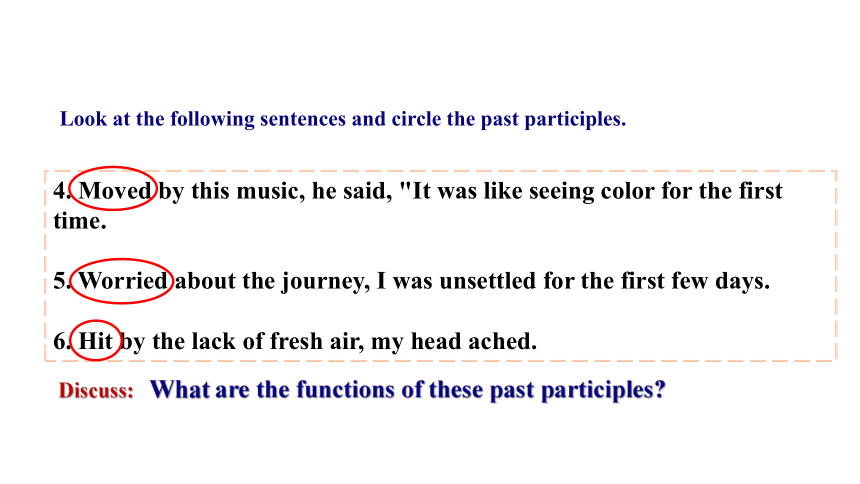
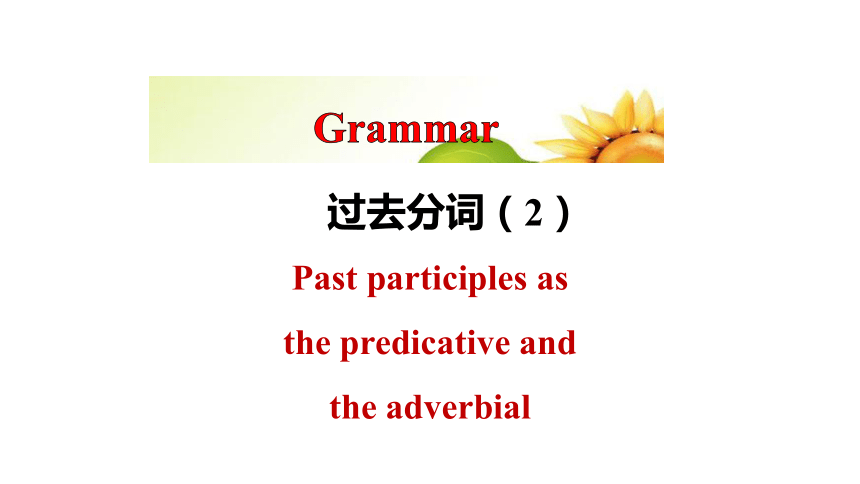
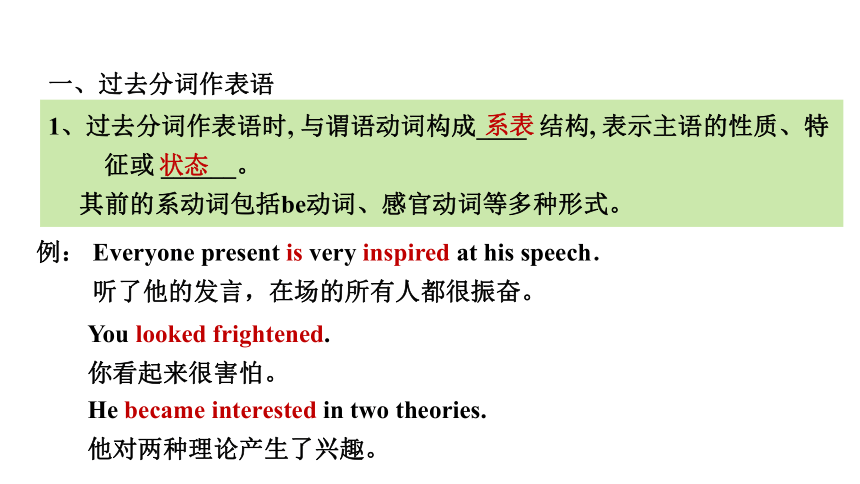
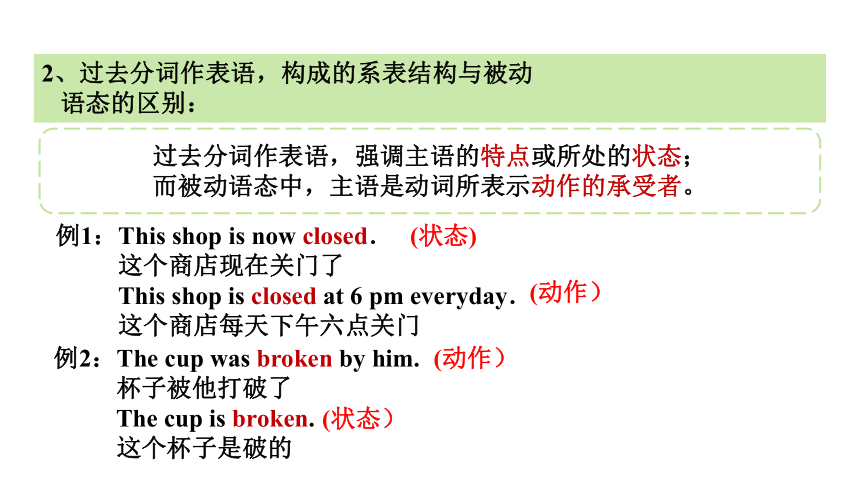

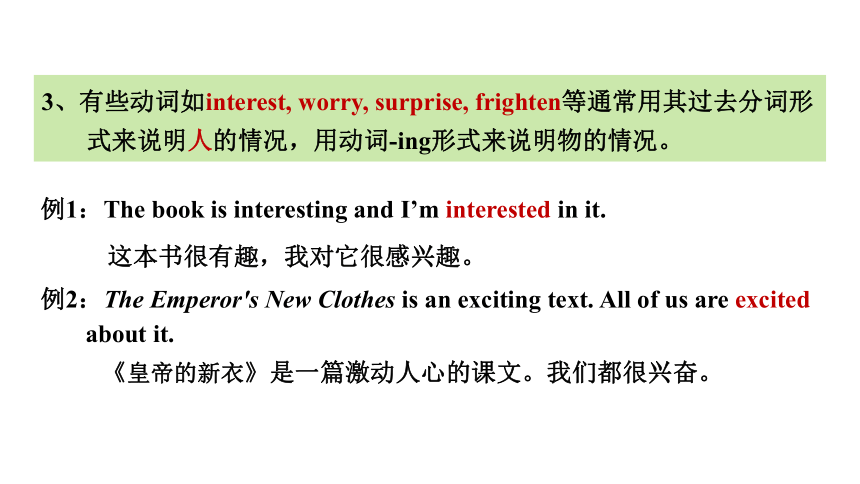

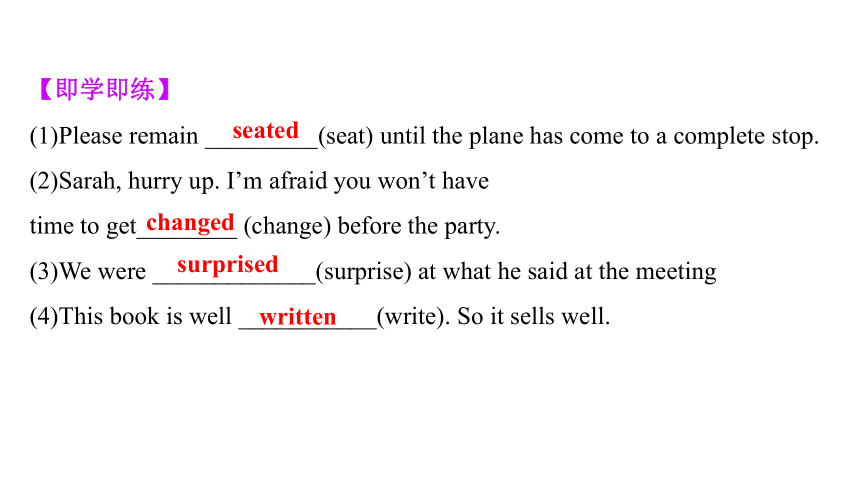

文档简介
(共30张PPT)
1.To learn the Past participles as the predicative and the adverbial.
2.To Find out the differences in meaning and function between the active and passive forms.
Look at the following sentences and circle the past participles.
1. Born in the USA on 2 January 1970, Whitacre began studying music at the University of Nevada in 1988.
2. She looked worried.
3. The door remained locked.
Look at the following sentences and circle the past participles.
4. Moved by this music, he said, "It was like seeing color for the first time.
5. Worried about the journey, I was unsettled for the first few days.
6. Hit by the lack of fresh air, my head ached.
Discuss: What are the functions of these past participles
过去分词(2)
Past participles as
the predicative and
the adverbial
一、过去分词作表语
1、过去分词作表语时, 与谓语动词构成____ 结构, 表示主语的性质、特
征或 ______。
其前的系动词包括be动词、感官动词等多种形式。
例: Everyone present is very inspired at his speech.
听了他的发言,在场的所有人都很振奋。
You looked frightened.
你看起来很害怕。
He became interested in two theories.
他对两种理论产生了兴趣。
系表
状态
例1:This shop is now closed.
这个商店现在关门了
This shop is closed at 6 pm everyday.
这个商店每天下午六点关门
(状态)
(动作)
2、过去分词作表语,构成的系表结构与被动
语态的区别:
过去分词作表语,强调主语的特点或所处的状态;
而被动语态中,主语是动词所表示动作的承受者。
例2:The cup was broken by him.
杯子被他打破了
The cup is broken.
这个杯子是破的
(动作)
(状态)
有些过去分词(短语)源于系表结构,作状语时不表动作而表状态。
be dressed in
be lost in 沉浸在
be devoted to 致力于
be supposed to 应该
be located in 位于
be buried in 专心于
be compared with
be seated
be prepared for
be determined to do
be tired of 厌烦
be absorbed in
be born in…
be occupied in 忙于…
3、有些动词如interest, worry, surprise, frighten等通常用其过去分词形式来说明人的情况,用动词-ing形式来说明物的情况。
例1:The book is interesting and I’m interested in it.
这本书很有趣,我对它很感兴趣。
例2:The Emperor's New Clothes is an exciting text. All of us are excited about it.
《皇帝的新衣》是一篇激动人心的课文。我们都很兴奋。
amused (愉快的); broken (碎了的);
closed (关闭的); astonished (吃惊的);crowded (拥挤的); experienced (有经验的); delighted (高兴的); lost (丢失的);
gone (遗失的); disappointed (失望的);worried (担忧的); interested (感兴趣的); tired (疲劳的); pleased (高兴的);satisfied (满意的); surprised (吃惊的); married (已婚的); known (著名的) 等等
常见的作表语的V-ed有:
【即学即练】
(1)Please remain _________(seat) until the plane has come to a complete stop.
(2)Sarah, hurry up. I’m afraid you won’t have
time to get________ (change) before the party.
(3)We were _____________(surprise) at what he said at the meeting
(4)This book is well ___________(write). So it sells well.
seated
changed
surprised
written
二、过去分词作状语
1、过去分词作状语时,过去分词表示被动、完成的动作,与主句主语之间是逻辑上的动宾关系。
Given more attention, the tree can grow better.
如果多加注意,这棵树会长得更好。
Asked what had happened, his face turned red.
当问到发生了什么事时,他的脸变红了。
2、过去分词作状语,可以表示时间、原因、条件、让步、方式或伴随情况等,相当于一个状语从句。
例:Once published, his works became famous for the absence of rhyme at the end of each line. 他的作品一发表,就以行尾不押韵而闻名。
(1) 时间状语
Once it was published, his work became famous for the absence of rhyme at the end of each line.
例1:
Done in a hurry, his homework was full of mistake.
由于匆忙完成,他的家庭作业错误百出。
(2) 原因状语
Since/As she was given advice by the famous detective, the young lady was no longer afraid.
例2:
Given advice by the famous detective, the young lady was no longer afraid.
有了著名侦探的指点,这位年轻姑娘不再害怕了。
Because it was done in a hurry, his homework was full of mistake.
例:
Given more time, we will do better.给我们更多的时间,我们会做得更好。
(3) 条件状语
If we are given more time, we will do better.
(4) 让步状语
例:
Even if invited, I will not take part in the party. 即使受到邀请,我也不会参加这个聚会。
Even if I am invited, I will not take part in the party.
例:The old man walked in the park, supported by his wife.
那位老人由妻子搀扶着在公园里散步。
(1)逻辑关系
The old man walked in the park and was supported by his wife.
3、现在分词与过去分词作状语的区别
现在分词作状语时,现在分词所表示的动作与句子主语之间构成逻辑上的主谓关系。
(5)方式或伴随状语
例:
He went out, shutting the door behind him.
他出去后随手关上了门。
he是shut动作的发出者
过去分词作状语时,过去分词所表示的动作与句
子主语之间构成逻辑上的动宾关系。
例:Given more encouragement, the boy could have behaved better.
如果多给这个男孩一些鼓励,他本能表现得更好。
(2)时间概念
过去分词所表示的动作发生在谓语动作之前,或
表示“一种状态”。
例1:Written in French, the letter cannot be understood.
这封信是用法语写的,很难理解。
the boy与give是动宾关系
现在分词表示的动作与谓语动作同时发生或在说话时正在进行。
例2:Built in 1910, the museum is almost 100 years old.
该博物馆建于1910年,几乎有100年的历史。
例1:I stood there, waiting for her.
我站在那儿等她。
例2:Walking along the street, I met Mary.
在街上走的时候, 我遇到了玛丽。
1.过去分词作状语时,有时为了强调,前面可带有连词,如:when,
while, if, though, as if, unless, until等,以使句意表达得更清楚。
Eg. Unless constantly repeated, the English words are easily forgotten.
When asked why she came here, the girl kept silent.
2.有些过去分词(短语)来源于系表结构,作状语时不表示被动而重在描述
主语的状态。这样的过去分词及短语常见的有:lost (迷失的), seated (坐),
hidden (隐藏的), lost/absorbed in (沉浸于), dressed in (穿着)等。
Lost in thought, he didn't hear the bell.
注意事项
【即学即练】 1.Sarah pretended to be cheerful,___________(say) nothing about the
argument.
2. ___________(translate)into English, the sentence was found to have an
entirely different word order.
3.Mike found his missing car in the street outside his house,
___________(look)newly cleaned.
4. ___________(open)in 1955, Disneyland in California is regarded by many
as the fun park.
5. ___________(offer)an important role in a new movie, Andy has a chance
to become famous.
6. _________(face)with so much trouble,we failed to complete the task on
time.
saying
Translated
looking
Opened
Offered
Faced
Project 1
Rewrite the story using past participles as the adverbial.
EXAMPLE
The Silver Hall is usually used for singing performances and is full of cheers and energy.
1. Henry was highly interested in music and began to write original compositions when he was in high school.
Highly interested in music, Henry bagan to write original compositions when he was in high school.
Usually used for singing performances, the
Silver Hall is full of cheers and energy.
2. They were pleased with his music and songs and finally invited him to perform in the Silver Hall.
Pleased with his music and songs, they finally invited him to perform in the Silver Hall.
3. Though he was affected by gradual blindness soon after the performance, Henry was still capable of writing compositions and he found that creating music was a relief and cure for his illness.
Though affected by gradual blindness soon after the performance, Henry was still capable of writing compositions and he found that creating music was a relief and cure for his illness.
4. When he got absorbed in his world of music, he
felt as if he could "see" the beauty of the world
around him, like he had in his previous life.
Absorbed in his world of music, he felt as if he could "see" the beauty of the world around him, like he had in his previous life.
Find out the differences in meaning and function between the newly written sentences and the original ones.
Match the sentence halves and rewrite each sentence beginning with a past participle.
1. The room had been painted in dark colours
2. Dave was unemployed
3. The girl was moved by his romantic words
4. He was corrected by his teacher from time to time
5. The album was recorded in a new way
6. He was invited to perform on the stage
A. so he had time to consider what job he really wanted.
B. so he felt nervous and excited.
C. so it was expected to be popular with techno fans.
D. so she accepted his gift.
E. so it needed some bright lights.
F. so he lost interest in singing.
Answers: 1-E 2-A 3-D 4-F 5-C 6-B
Project 2
Rewrite the above sentences with the past participle.
1. Painted in dark colours, the room needed some bright lights.
2. Unemployed, Dave had time to consider what job he really wanted.
3. Moved by his romantic words, the girl accepted his gift.
4. Corrected by his teacher from time to time, he lost interest in singing.
5. Recorded in a new way, the album was expected to be popular with
techno fans.
6. Invited to perform on the stage, he felt nervous and excited.
Complete the passage with the words in brackets in their correct forms.
Well known as a successful band, the Impact members show quite a
few striking qualities. They never ever give up. When _________
(question) by the media, they are not ___________ (discourage) and
practise even harder. They are improving themselves by attending
several master training classes. They are united. _________ (fill with)
team spirit, they act as a whole, always aiming for glory.
questioned
discouraged
Filled with
Project 3
过去分词作表语和状语
过去分词作表语
1.放在连系动词be, get, feel, remain, seem, look, become等之后作表语,表示主语所处的状态。
2.过去分词作表语时与被动语态的区别:
过去分词作表语时,强调主语所处的状态;而动词的被动语态表示主语是动作的承受者,强调动作。
3.感觉类及物动词的现在分词与过去分词作表语的区别
过去分词作表语多表示人自身的感受或事物自身的状态,常译作“感到……的”;现在分词多表示事物具有的特性,常译作“令人……的”。
表示时间、原因、条件、让步、方式/伴随和结果,相当于一个状语从句。其逻辑主语为主句的主语,且与主句主语之间构成逻辑上的被动关系。
注意:有些过去分词(短语)因来源于系表结构,作状语时不强调被动而重在描述主语的状态。如:lost(迷路); seated(坐); hidden(躲); lost/absorbed in(沉溺于); dressed in(穿着); tired of(厌烦)。
过去分词与现在分词作状语的区别:
过去分词与句子的主语之间存在逻辑上的动宾关系,即表示被动;现在分词与句子的主语之间存在逻辑上的主谓关系,即表示主动。
过去分词作状语
Summary
Exercises
Ⅰ根据提示填空
1._______ (move) by what I said, she stood there for a moment.
感我此言良久立 (白居易 《琵琶行》)
2._______ (give) the talent by the heaven, I will employ it!
天生我材必有用 (李白 《将进酒》)
3.______ (wake) at dawn from a misty dream, I read, a year later, news from home.
远梦归侵晓, 家书到隔年 (杜牧 《旅宿》)
Moved
Given
Waken
4.When ___________ (question) under a pine tree, “My teacher,”
the pupil answered, “went for herbs”.
松下问童子, 言师采药去(贾岛 《寻隐者不遇》
Ⅱ翻译句子
1.这座城市三面环山。
2.这本书很有趣,我对它很感兴趣。
3.那些日子一去不复返了。
questioned
The city is surrounded on three sides by mountains.
The book is interesting and I'm interested in it.
Those days are passed and gone.
Where there is a will, there is a way.
有志者,事竟成。
1.To learn the Past participles as the predicative and the adverbial.
2.To Find out the differences in meaning and function between the active and passive forms.
Look at the following sentences and circle the past participles.
1. Born in the USA on 2 January 1970, Whitacre began studying music at the University of Nevada in 1988.
2. She looked worried.
3. The door remained locked.
Look at the following sentences and circle the past participles.
4. Moved by this music, he said, "It was like seeing color for the first time.
5. Worried about the journey, I was unsettled for the first few days.
6. Hit by the lack of fresh air, my head ached.
Discuss: What are the functions of these past participles
过去分词(2)
Past participles as
the predicative and
the adverbial
一、过去分词作表语
1、过去分词作表语时, 与谓语动词构成____ 结构, 表示主语的性质、特
征或 ______。
其前的系动词包括be动词、感官动词等多种形式。
例: Everyone present is very inspired at his speech.
听了他的发言,在场的所有人都很振奋。
You looked frightened.
你看起来很害怕。
He became interested in two theories.
他对两种理论产生了兴趣。
系表
状态
例1:This shop is now closed.
这个商店现在关门了
This shop is closed at 6 pm everyday.
这个商店每天下午六点关门
(状态)
(动作)
2、过去分词作表语,构成的系表结构与被动
语态的区别:
过去分词作表语,强调主语的特点或所处的状态;
而被动语态中,主语是动词所表示动作的承受者。
例2:The cup was broken by him.
杯子被他打破了
The cup is broken.
这个杯子是破的
(动作)
(状态)
有些过去分词(短语)源于系表结构,作状语时不表动作而表状态。
be dressed in
be lost in 沉浸在
be devoted to 致力于
be supposed to 应该
be located in 位于
be buried in 专心于
be compared with
be seated
be prepared for
be determined to do
be tired of 厌烦
be absorbed in
be born in…
be occupied in 忙于…
3、有些动词如interest, worry, surprise, frighten等通常用其过去分词形式来说明人的情况,用动词-ing形式来说明物的情况。
例1:The book is interesting and I’m interested in it.
这本书很有趣,我对它很感兴趣。
例2:The Emperor's New Clothes is an exciting text. All of us are excited about it.
《皇帝的新衣》是一篇激动人心的课文。我们都很兴奋。
amused (愉快的); broken (碎了的);
closed (关闭的); astonished (吃惊的);crowded (拥挤的); experienced (有经验的); delighted (高兴的); lost (丢失的);
gone (遗失的); disappointed (失望的);worried (担忧的); interested (感兴趣的); tired (疲劳的); pleased (高兴的);satisfied (满意的); surprised (吃惊的); married (已婚的); known (著名的) 等等
常见的作表语的V-ed有:
【即学即练】
(1)Please remain _________(seat) until the plane has come to a complete stop.
(2)Sarah, hurry up. I’m afraid you won’t have
time to get________ (change) before the party.
(3)We were _____________(surprise) at what he said at the meeting
(4)This book is well ___________(write). So it sells well.
seated
changed
surprised
written
二、过去分词作状语
1、过去分词作状语时,过去分词表示被动、完成的动作,与主句主语之间是逻辑上的动宾关系。
Given more attention, the tree can grow better.
如果多加注意,这棵树会长得更好。
Asked what had happened, his face turned red.
当问到发生了什么事时,他的脸变红了。
2、过去分词作状语,可以表示时间、原因、条件、让步、方式或伴随情况等,相当于一个状语从句。
例:Once published, his works became famous for the absence of rhyme at the end of each line. 他的作品一发表,就以行尾不押韵而闻名。
(1) 时间状语
Once it was published, his work became famous for the absence of rhyme at the end of each line.
例1:
Done in a hurry, his homework was full of mistake.
由于匆忙完成,他的家庭作业错误百出。
(2) 原因状语
Since/As she was given advice by the famous detective, the young lady was no longer afraid.
例2:
Given advice by the famous detective, the young lady was no longer afraid.
有了著名侦探的指点,这位年轻姑娘不再害怕了。
Because it was done in a hurry, his homework was full of mistake.
例:
Given more time, we will do better.给我们更多的时间,我们会做得更好。
(3) 条件状语
If we are given more time, we will do better.
(4) 让步状语
例:
Even if invited, I will not take part in the party. 即使受到邀请,我也不会参加这个聚会。
Even if I am invited, I will not take part in the party.
例:The old man walked in the park, supported by his wife.
那位老人由妻子搀扶着在公园里散步。
(1)逻辑关系
The old man walked in the park and was supported by his wife.
3、现在分词与过去分词作状语的区别
现在分词作状语时,现在分词所表示的动作与句子主语之间构成逻辑上的主谓关系。
(5)方式或伴随状语
例:
He went out, shutting the door behind him.
他出去后随手关上了门。
he是shut动作的发出者
过去分词作状语时,过去分词所表示的动作与句
子主语之间构成逻辑上的动宾关系。
例:Given more encouragement, the boy could have behaved better.
如果多给这个男孩一些鼓励,他本能表现得更好。
(2)时间概念
过去分词所表示的动作发生在谓语动作之前,或
表示“一种状态”。
例1:Written in French, the letter cannot be understood.
这封信是用法语写的,很难理解。
the boy与give是动宾关系
现在分词表示的动作与谓语动作同时发生或在说话时正在进行。
例2:Built in 1910, the museum is almost 100 years old.
该博物馆建于1910年,几乎有100年的历史。
例1:I stood there, waiting for her.
我站在那儿等她。
例2:Walking along the street, I met Mary.
在街上走的时候, 我遇到了玛丽。
1.过去分词作状语时,有时为了强调,前面可带有连词,如:when,
while, if, though, as if, unless, until等,以使句意表达得更清楚。
Eg. Unless constantly repeated, the English words are easily forgotten.
When asked why she came here, the girl kept silent.
2.有些过去分词(短语)来源于系表结构,作状语时不表示被动而重在描述
主语的状态。这样的过去分词及短语常见的有:lost (迷失的), seated (坐),
hidden (隐藏的), lost/absorbed in (沉浸于), dressed in (穿着)等。
Lost in thought, he didn't hear the bell.
注意事项
【即学即练】 1.Sarah pretended to be cheerful,___________(say) nothing about the
argument.
2. ___________(translate)into English, the sentence was found to have an
entirely different word order.
3.Mike found his missing car in the street outside his house,
___________(look)newly cleaned.
4. ___________(open)in 1955, Disneyland in California is regarded by many
as the fun park.
5. ___________(offer)an important role in a new movie, Andy has a chance
to become famous.
6. _________(face)with so much trouble,we failed to complete the task on
time.
saying
Translated
looking
Opened
Offered
Faced
Project 1
Rewrite the story using past participles as the adverbial.
EXAMPLE
The Silver Hall is usually used for singing performances and is full of cheers and energy.
1. Henry was highly interested in music and began to write original compositions when he was in high school.
Highly interested in music, Henry bagan to write original compositions when he was in high school.
Usually used for singing performances, the
Silver Hall is full of cheers and energy.
2. They were pleased with his music and songs and finally invited him to perform in the Silver Hall.
Pleased with his music and songs, they finally invited him to perform in the Silver Hall.
3. Though he was affected by gradual blindness soon after the performance, Henry was still capable of writing compositions and he found that creating music was a relief and cure for his illness.
Though affected by gradual blindness soon after the performance, Henry was still capable of writing compositions and he found that creating music was a relief and cure for his illness.
4. When he got absorbed in his world of music, he
felt as if he could "see" the beauty of the world
around him, like he had in his previous life.
Absorbed in his world of music, he felt as if he could "see" the beauty of the world around him, like he had in his previous life.
Find out the differences in meaning and function between the newly written sentences and the original ones.
Match the sentence halves and rewrite each sentence beginning with a past participle.
1. The room had been painted in dark colours
2. Dave was unemployed
3. The girl was moved by his romantic words
4. He was corrected by his teacher from time to time
5. The album was recorded in a new way
6. He was invited to perform on the stage
A. so he had time to consider what job he really wanted.
B. so he felt nervous and excited.
C. so it was expected to be popular with techno fans.
D. so she accepted his gift.
E. so it needed some bright lights.
F. so he lost interest in singing.
Answers: 1-E 2-A 3-D 4-F 5-C 6-B
Project 2
Rewrite the above sentences with the past participle.
1. Painted in dark colours, the room needed some bright lights.
2. Unemployed, Dave had time to consider what job he really wanted.
3. Moved by his romantic words, the girl accepted his gift.
4. Corrected by his teacher from time to time, he lost interest in singing.
5. Recorded in a new way, the album was expected to be popular with
techno fans.
6. Invited to perform on the stage, he felt nervous and excited.
Complete the passage with the words in brackets in their correct forms.
Well known as a successful band, the Impact members show quite a
few striking qualities. They never ever give up. When _________
(question) by the media, they are not ___________ (discourage) and
practise even harder. They are improving themselves by attending
several master training classes. They are united. _________ (fill with)
team spirit, they act as a whole, always aiming for glory.
questioned
discouraged
Filled with
Project 3
过去分词作表语和状语
过去分词作表语
1.放在连系动词be, get, feel, remain, seem, look, become等之后作表语,表示主语所处的状态。
2.过去分词作表语时与被动语态的区别:
过去分词作表语时,强调主语所处的状态;而动词的被动语态表示主语是动作的承受者,强调动作。
3.感觉类及物动词的现在分词与过去分词作表语的区别
过去分词作表语多表示人自身的感受或事物自身的状态,常译作“感到……的”;现在分词多表示事物具有的特性,常译作“令人……的”。
表示时间、原因、条件、让步、方式/伴随和结果,相当于一个状语从句。其逻辑主语为主句的主语,且与主句主语之间构成逻辑上的被动关系。
注意:有些过去分词(短语)因来源于系表结构,作状语时不强调被动而重在描述主语的状态。如:lost(迷路); seated(坐); hidden(躲); lost/absorbed in(沉溺于); dressed in(穿着); tired of(厌烦)。
过去分词与现在分词作状语的区别:
过去分词与句子的主语之间存在逻辑上的动宾关系,即表示被动;现在分词与句子的主语之间存在逻辑上的主谓关系,即表示主动。
过去分词作状语
Summary
Exercises
Ⅰ根据提示填空
1._______ (move) by what I said, she stood there for a moment.
感我此言良久立 (白居易 《琵琶行》)
2._______ (give) the talent by the heaven, I will employ it!
天生我材必有用 (李白 《将进酒》)
3.______ (wake) at dawn from a misty dream, I read, a year later, news from home.
远梦归侵晓, 家书到隔年 (杜牧 《旅宿》)
Moved
Given
Waken
4.When ___________ (question) under a pine tree, “My teacher,”
the pupil answered, “went for herbs”.
松下问童子, 言师采药去(贾岛 《寻隐者不遇》
Ⅱ翻译句子
1.这座城市三面环山。
2.这本书很有趣,我对它很感兴趣。
3.那些日子一去不复返了。
questioned
The city is surrounded on three sides by mountains.
The book is interesting and I'm interested in it.
Those days are passed and gone.
Where there is a will, there is a way.
有志者,事竟成。
